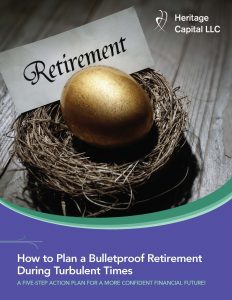How Interest Rate Changes REALLY Impact Retirement
Yes, higher interest rates are here. No, they do not signal the end of your assets or savings.
Despite market volatility in the markets and drama in the news, you can still retire with confidence in CT.
In fact, retirees and those planning to retire in the New Haven and Hartford areas do not need to panic. Read on and I will explain both why and how you may even be able to increase your returns.
Inflation, Interest Rates, & Your Retirement
For nearly a century, interest rate hikes have followed rising inflation in the U.S. Whenever the inflationary rate reaches a certain point, the Fed steps in, raising interest rates in order to slow things down.
The good news is that these resulting interest rate hikes can increase the yield that you receive from your bond and cash holdings.
The bad news is that your purchasing power may also continue eroding at some point due to inflation continuing to push prices up.
The difference between these outcomes can depend mainly on the balance of your portfolio and the diversification of your assets. So, the problem is generally fixable.
First, we need to take inventory of any fixed interest rate assets. Normally these can lose value when interest rates rise because they are no longer competitive with market rate yields.
However, these are not normal times. In fact, if a portion of your income is coming from fixed-income investments, you may actually see higher annuity payments from insurance companies in the months ahead.
This is likely because insurance companies invest annuity reserves into loans, like mortgages. When the Fed raises interest rates, insurers respond by offering annuities with higher annuity payments.
As a result, if you buy an annuity today, it will likely pay more than one you had purchased two or three months ago. This boost allows the creation of additional money for your retirement income.
Pension Planning

If you are nearing retirement with a pension, you will need to consider whether or not you want a lump sum upfront or an annuity; payments over time.
A lump sum can look tempting. However, make sure that you review how rising interest rates could affect the actual amount that you would receive before you decide.
I say this because the higher the interest rates are when that lump sum is calculated (in order to match the annuity), the smaller that your resulting sum will be.
Pensions have a minimum liability. This refers to when the accumulated monetary obligation for a plan exceeds the fair market value of its assets.
Sooner or later, the plan’s sponsor will have to fund it in order to cover beneficiaries’ payouts. Pension liabilities are accrued as expenses.
Imagine a giant pair of scales: One side holds a pension liability. Meanwhile, interest rates are seated on the other. If rates go down, the liability rises and vice versa.
This is their fundamental, unchanging relationship. So, as interest rates rise, liabilities will, predictably, decline. Unfortunately, this can mean a reduction in those pensions’ value.
Fortify Your 401(k)
If you have a 401(k), it may be time to consider moving some of your equity or cash into bond funds.
As interest rates have risen, this means higher yields on newly purchased bonds. If and when rates peak, that would lead to an additional upside for bond investors.
While rising rates normally trigger the descent of fixed-rate assets’ current value, money market and short-term bond funds have a sort of accidental safeguard: Since these funds are usually obligated to stick to short-term investing, the negative impact can be lessened.
Avoid Hoarding Cash
Setting aside cash can be wise, but do so in moderation. Even when markets are calm, keeping an emergency fund of 3-6 months’ worth of expenses is generally a great idea.
I would keep that money in a high-yield account at an FDIC-insured bank. However, I would not hold out much more than your normal household operating expenses.
There are two reasons for this. The first is that during inflationary times, cash does not keep up well. By definition, inflation is essentially money losing value. An 8% inflation rate means your cash in the bank is losing 8% of its purchasing power every year.
Historically, inflation has often resulted from too much currency circulating within an economy. So, the purchasing power of cash decreases further and further.
Imagine that you paid $10 at a store for a gallon of milk, a loaf of bread, and a box of cereal today. Next month, if inflation continues, that same $10 bill may only cover the milk and bread.
By holding excess amounts of cash, inflation will definitely reduce your purchasing power. However, by investing that money in securities that excel with inflation you have the opportunity to see that money grow.
Right now, there are bargains not seen since the darkest days of COVID in March 2020. That’s because inflation is high, interest rates are increasing, growth is slowing and the supply chain remains bogged down.
Regardless, once the supply chain starts to get unclogged, the companies most impacted may see a very strong rebound in their shares.
Invested Interests

The bottom line, whether you are retired or planning for retirement, is that all is far from lost. Making adjustments for coming interest rate hikes only makes sense.
Panicking, on the other hand, often leads to mistakes that prove expensive in the long run. So, come by for an investment portfolio review, in case your assets need rebalancing.
If you need to find a new advisor, I am currently offering a 6-month free trial. We can sit down, assess your investments’ diversification, consider potential long-term (income and capital gains) tax minimization strategies, and more.
If you have been wondering how to switch investment advisors, it really could be this easy. Start working with me to build better safeguards for your wealth.
Contact us to get a second opinion in New Haven today.


